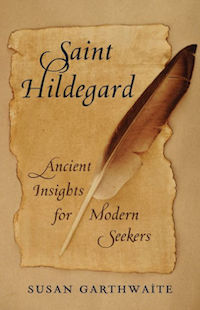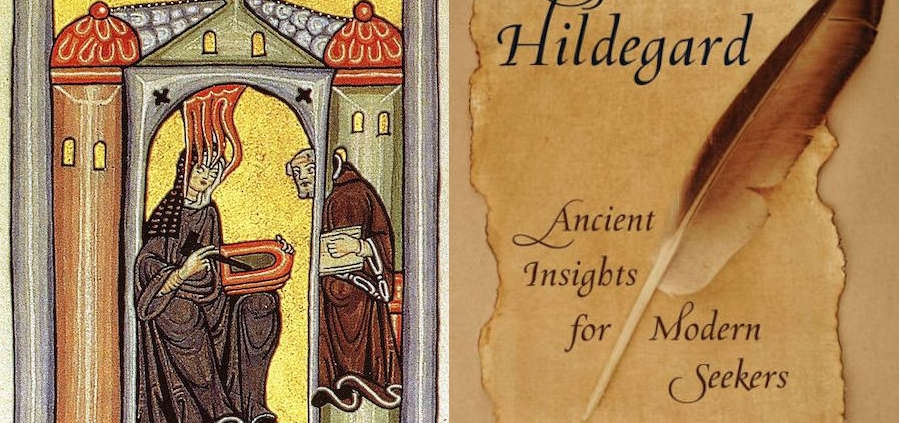Speaking with Saint Hildegard by Nathaniel M. Campbell
 Saint Hildegard:
Saint Hildegard:
Ancient Insights for Modern Seekers
By Susan Garthwaite
She Writes Press, 2021
$16.95 392 pp.
“Study is not prayer,” notes Susan Garthwaithe in her new book, Saint Hildegard: Ancient Insights for Modern Seekers. For academic theologians like me, this can indeed be one of the great stumbling blocks, both for growing in our own faith and for helping others grow in theirs. Reading ancient saints like Hildegard of Bingen in their historical context can make it difficult to connect our lives to theirs. I am neither a monk nor a member of the minor medieval nobility. The superficial outlines of my life’s experience (a pandemic’s shadow notwithstanding) seem insuperably distant from hers. A colleague once asked me what I had learned from my work on Hildegard. I could prattle on about any number of academic theological issues, but I could not point to any spiritual fruit in my own life. Meanwhile, as an expert in Hildegard’s works, popular books about her often irk me. I find myself nitpicking the oversimplifications and being frustrated by the lack of proper context.
So I was wary when I picked up Garthwaithe’s new volume. A thumb through the back matter quickly set my academic heart at ease, however: it is meticulously sourced, with every single quote from Hildegard’s works (and there’s a lot of them—Garthwaite estimates that Hildegard’s own words make up 30 percent of the text) given page number references in authoritative English translations. So the sourcing was sound—but what about the interpretation? At first blush, it seemed that she had gathered together many lovely quotes and then simply sprinkled these bons mots across the text.
But it turns out that when Saint Hildegard and Susan Garthwaite speak together, the conversation is lively, compelling, and holy. The value of Garthwaite’s book is that, in marrying accounts of her own, modern spiritual life to Hildegard’s ancient words, she removes the historical distance that so often keeps this academic’s spiritual fruit from growing. I’ve read and translated any number of passages in Hildegard’s writings about the spiritual dangers of bitterness, for example—but it took Garthwaite’s intertwining of those passages with her own experiences processing a traumatic childhood leg injury to get me to finally see the concrete problems in my own life right now. I had not realized how my chafing at the limitations placed on life by the pandemic had let bitterness into my heart, and that as a result (in Hildegard’s words) I was “despoiling” myself of “the good treasures” around me.
The book opens with a brief section on “Becoming a seeker,” where vignettes from Garthwaite’s childhood help us to see how God plants the seeds for the relationship he desires with us. Garthwaite then addresses growth in that relationship from two angles: “Becoming the faithful friend of your soul,” and “Becoming the faithful friend of God.” The chapters for befriending your soul focus on five spiritual practices that help us to better know ourselves as spiritual creatures: journaling, reading (and praying with) Scripture, spiritual direction, prayer, and discernment.
“To discern is to hold oneself in the balance that supports good hearing,” Garthwaite writes—but her words could easily have been Hildegard’s, as she has thoroughly internalized the Visionary Doctor’s theology of discernment. She makes that theology come alive through application to her own life, such as with a prayer labyrinth ministry gone awry, or the lifestyle choices required to keep diabetes in check. She also fruitfully deploys the framework of Ignatian discernment to fulfill the practical lacunae left by Hildegard’s less-than-systematic theology. In the end, I learned something about Hildegard’s approach to discernment that I had not recognized before: Garthwaite identifies the experiences of “desolation” and “consolation” as key indicators of spiritual discerning.
But Garthwaite’s masterpiece is the third section of the book, on befriending God, and especially her treatment of mysticism. She skillfully resolves the problems that come with classing Hildegard as a mystic by highlighting the missional aspect of experiencing God directly in the soul. Although Hildegard certainly had mystical experiences, she does not tell us much of the spiritual practice of mysticism—but Garthwaite’s own lucid and disarmingly humble descriptions are one of the book’s greatest achievements. Instead, Hildegard’s mystical experiences resulted in a prophetic mission to teach God’s message and arouse justice among his people. When Garthwaite relates God’s mystical locutions to her to act swiftly with mercy and justice to save the job of one of her administrative assistants, she shows that her own mystical experiences shared the missional quality of Hildegard’s. “[M]ystical experiences are about the agenda of God,” Garthwaite notes, “not one’s preexisting holiness.”
The one small quibble I have is the treatment of gendered language within Hildegard’s writings. The general refusal to use pronouns for God (and the occasional, cringe-inducing “Godself”), though cumbersome, is relatively unobjectionable. But Garthwaite has sometimes introduced feminine language where Hildegard originally used masculine. Hildegard’s many feminine images for the divine, like Love or Wisdom, are balanced by masculine words like Deus (“God”), and that balance should be respected. When she speaks of God’s “bosom” (as in Letter 362), the Latin word is sinum, which is a non-gendered term meaning “lap” (and anyone who has seen Michelangelo’s Sistine Chapel ceiling knows that a masculine God can indeed have a bosom). Likewise, it is generally not a problem that Garthwaite substitutes feminine for masculine pronouns when Hildegard is speaking about a generic “human person” (homo)—after all, many of Hildegard’s insights spring from her own experience. But on at least one occasion (a quote from The Book of the Rewards of Life 4.52), Garthwaite feminizes a passage where homo specifically refers to Adam. Overall, however, these are minor annoyances that do not significantly detract from the spiritual value of the book.
Indeed, there is serendipity in Garthwaite’s communion with St. Hildegard. A particularly poignant example is when Hildegard’s unique spiritual exegesis of the Parable of Lazarus and the Rich Man aligns retroactively with the role of the same parable in Garthwaite’s battle with PTSD. But it also appears throughout the book as different aspects of Garthwaite’s life—her scientific career, her work as a spiritual director, her mystical experiences—intertwine with Hildegard’s. “Integration” is thus the Hildegardian keystone of this spiritual work. The chapter that bears that title focuses on integrating the sacred and secular sides of our lives, and relates Garthwaite’s time as a biomedical researcher, when she and some of her colleagues chose Hildegard as their project patron.
But integration is also at play when she discusses the deep healing available through prayer. Garthwaite was able to process her childhood trauma, not by refusing it or even by “offering it up,” but by integrating it into her identity, by seeing it through Jesus’s eyes. His mystical promise to her was that her wounds would be like His, and it was through prayerful integration of her trauma that it was transformed into the sparkling gem that God sees in his wondrous work, the human being. This is Hildegard’s benediction for us, that we may become “living stones” as friends of God.
Nathaniel M. Campbell a medievalist and an adjunct college instructor in the humanities at Union College. His research includes medieval theologies of history, text/image relationships in visionary and mystical texts, and the writings St. Hildegard of Bingen. His translation of Hildegard’s Book of Divine Works is available from Catholic University of America Press here. He completed a master’s in Medieval Studies at the University of Notre Dame in 2010, a Fulbright Fellowship in Germany in 2008, and a B.A. in Classics and German at Boston College in 2007.





Leave a Reply
Want to join the discussion?Feel free to contribute!